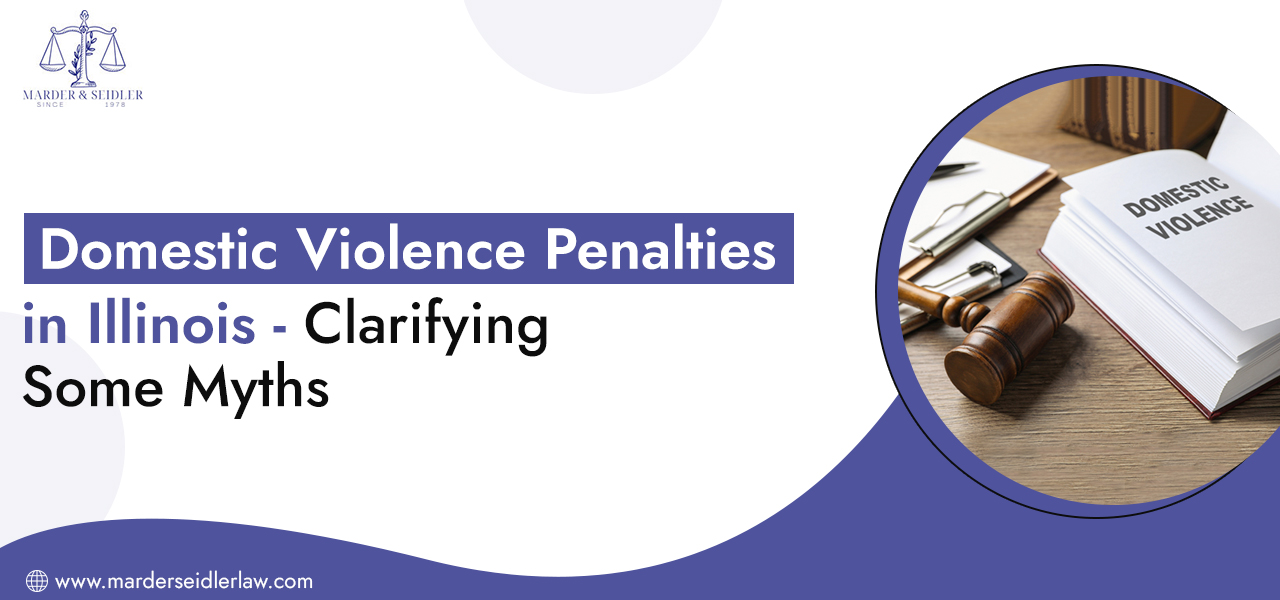Domestic Violence Penalties in Illinois-Clarifying Some Myths

Domestic violence is a serious issue, and each state has its own set of laws and penalties to address it. In Illinois, domestic violence penalties are strict and designed to protect victims and hold offenders accountable. However, there are many myths and misconceptions surrounding them. Understanding the reality of domestic violence penalties in Illinois is crucial for both victims and those accused of such offenses. Let’s dive into some common myths and clarify what the law actually entails.
Common Myths of Domestic Violence Penalties
Myth 1: Domestic Violence is Always a Misdemeanor in Illinois
Fact: One of the biggest misconceptions is that domestic violence offenses are always treated as misdemeanors. While some domestic violence charges may start as misdemeanors, the penalties can escalate depending on the circumstances. For example, if the offender has previous domestic violence convictions or if the incident involved severe injury, the charge can be elevated to a felony. Felony domestic violence penalties in Illinois are much harsher and can include longer jail time and higher fines. Therefore, it’s a myth that domestic violence is always a “minor” crime.
Myth 2: Only Physical Abuse is Considered Domestic Violence
Fact: Many people believe that domestic violence penalties in Illinois only apply to cases of physical abuse. However, Illinois law recognizes that domestic violence can take many forms, including emotional, psychological, and financial abuse. Stalking, harassment, and even controlling behaviors that intimidate or isolate the victim can also fall under the umbrella of domestic violence. The aim is to address all forms of abuse that can negatively impact an individual’s safety and well-being.

Myth 3: Victims Can Drop Domestic Violence Charges
Fact: A common myth is that if the victim decides not to press charges, the case will automatically be dropped. In Illinois, once a domestic violence report is made and charges are filed, the case is in the hands of the state prosecutor. The prosecutor may decide to pursue the case even if the victim wishes to withdraw their complaint. This is because domestic violence is seen as a crime against the state, not just the individual. The state seeks to prevent further harm and ensure justice, even if the victim changes their mind about proceeding. Therefore, the decision to drop or continue with domestic violence penalties is not solely up to the victim.
Myth 4: Penalties Are Not Severe for First-Time Offenders
Fact: While it’s true that penalties for first-time offenders may be less severe than for repeat offenders, this does not mean they are lenient. First-time domestic violence penalties in Illinois can include jail time, fines, mandatory counseling, and restraining orders. For example, a first-time conviction for domestic battery is classified as a Class A misdemeanor, which can result in up to one year in jail and a fine of up to $2,500. Additionally, a conviction can lead to a permanent criminal record, impacting employment and other aspects of life.
Myth 5: A Domestic Violence Conviction Only Affects Criminal Records
Fact: Another misconception is that domestic violence penalties in Illinois only impact one’s criminal record. In reality, a conviction can have far-reaching consequences beyond legal implications. For instance, individuals convicted of domestic violence may lose custody or visitation rights with their children, face restrictions on firearm ownership, and have difficulties securing housing or employment. In some cases, a domestic violence conviction can also affect immigration status, potentially leading to deportation for non-citizens. These collateral consequences highlight the gravity of domestic violence charges and the importance of taking them seriously.
Conclusion
Understanding the reality behind domestic violence penalties in Illinois is crucial for anyone involved in or affected by such situations. It’s essential to know that domestic violence is not limited to physical abuse, consequences can escalate to felonies, and the impact of a conviction can extend far beyond a criminal record. Whether you’re a victim seeking protection or someone facing accusations, it’s vital to have a clear understanding of the law and its implications.
If you or someone you know is dealing with domestic violence, it’s important to seek help from a domestic battery lawyer at Marder & Seidler and understand your rights and responsibilities under Illinois law. With 40+ years of experience in helping out clients across Illinois, we are available 24/7 on (847) 985-6767 to support your case. You are just one call away from a better and secured future.
